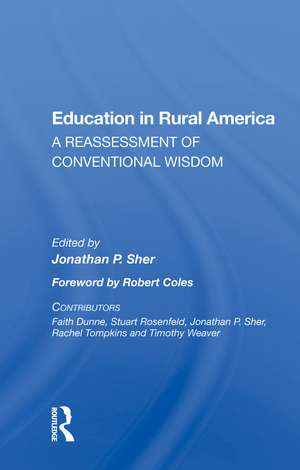Education In Rural America: A Reassessment Of Conventional Wisdom
Autor Jonathan P. Sheren Limba Engleză Hardback – 7 iun 2019
Preț: 764.20 lei
Preț vechi: 1027.40 lei
-26% Nou
Puncte Express: 1146
Preț estimativ în valută:
146.23€ • 153.08$ • 120.100£
146.23€ • 153.08$ • 120.100£
Carte tipărită la comandă
Livrare economică 07-21 aprilie
Preluare comenzi: 021 569.72.76
Specificații
ISBN-13: 9780367017552
ISBN-10: 0367017555
Pagini: 414
Dimensiuni: 146 x 229 mm
Greutate: 0.45 kg
Ediția:1
Editura: Taylor & Francis
Colecția Routledge
Locul publicării:Oxford, United Kingdom
ISBN-10: 0367017555
Pagini: 414
Dimensiuni: 146 x 229 mm
Greutate: 0.45 kg
Ediția:1
Editura: Taylor & Francis
Colecția Routledge
Locul publicării:Oxford, United Kingdom
Cuprins
Foreword -- Pluralism in the Countryside: A Brief Profile of Rural America and Its Schools -- Panaceas as Policy -- The Urbanization of Rural Schools, 1840-1970 -- Economy, Efficiency, and Equality: The Myths of Rural School and District Consolidation -- Policy and Paradox -- Choosing Smallness: An Examination of the Small School Experience in Rural America -- Coping with Sparsity: A Review of Rural School Finance -- The Real World -- Class Conflict in Rural Education: A Case Study of Preston County, West Virginia -- Centralization versus Decentralization: A Case Study of Rural Education in Vermont -- Beyond Conventional Wisdom -- What’s Next? A Research and Action Agenda for Rural Education -- School-based Community Development Corporations: A New Strategy for Education and Development in Rural America
Descriere
Indifference has not always characterized American attitudes toward rural children, nor has neglect always been the cornerstone of state and federal policy toward rural education. Indeed, for nearly a century there was an avid and influential—though ultimately ineffective—rural school reform movement in the United States. But in recent years, rural education has become a "skeleton in the closet" of the education profession. More than 14 million children attend rural schools that receive only minuscule amounts of the nation s financial resources and professional attention. The authors of this book carefully analyze the beliefs, assumptions, policies, and practices that have shaped and continue to shape education in rural America, concluding that conventional wisdom in rural education has proved to be considerably more conventional than wise. They offer pragmatic suggestions for changes in rural schools, in educational policy, and in programs designed for rural communities. As Robert Coles tells us in his Foreword to the book, they "give us clear, strong, uncluttered prose—a good sign that they are able to offer sensible, honest, unpretentious suggestions and useful ideas. They give us. . .a social history that enables perspective . . . and [they give us] practical, well-argued suggestions for a public policy both humane and capable of realization for our rural areas."
